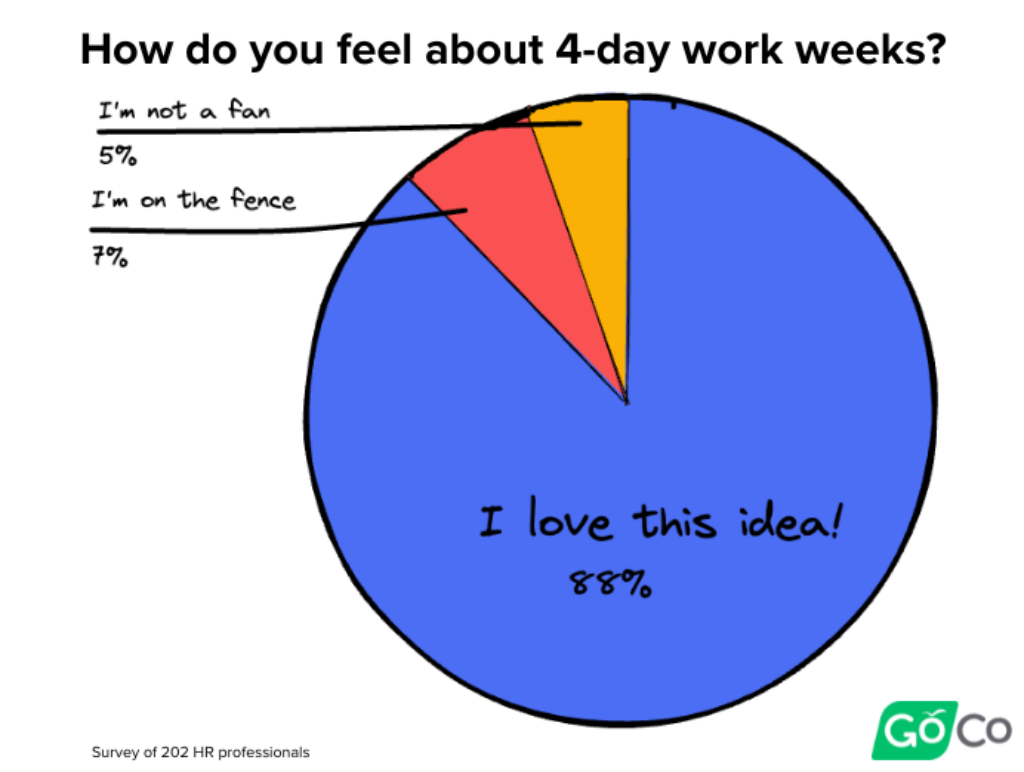Is a 4-day Work Week Right For Your Business? 8 HR Leaders Weigh the Pros and Cons
by Nick Schurk - July 11th, 2022
What are your thoughts on four-day work weeks? Has your company tried it? Why or why not? If you've tried it, what were the pros and cons?
To help you consider the pros and cons of a four-day work week, we asked HR leaders and business owners this question for their best insights. Here are 8 considerations for implementing a 4-day work week:
Flexibility for Small Businesses
4-day work weeks are entirely possible and provide massive psychological benefits to employees. Unfortunately, it is not always practical for small businesses where employees are required to wear multiple hats. Our business falls into the latter category, and we have not found the 4-day work week to be feasible for us long term. That being said, technology now allows us to be more mobile than ever and we decided to try a hybrid work-from-home culture which has been immensely successful for us.
Without being fully remote, employees are able to work entirely from home some days or work in the office half days and finish work at home. This flexibility allows everyone to feel freer and the end result is a happier and more productive team.
Ubaldo Perez, Hush Anesthetic
Increase Productivity with Flexible Scheduling
Flexibility, whether that be in the form of a four-day work week or the ability to work remotely, has been in high demand in recent years. Since mid-2020, our company has experimented with a number of flexible working models, eventually landing on one that allows our employees to (within reason) pick and choose their own hours to satisfy weekly expectations. This has resulted in some employees opting to work longer hours per day to have an extra day off, providing them with true ownership over their work-life balance. Productivity has increased since the introduction of this policy, as it allows employees to craft a schedule to maximize their own output.
The main reason that this policy was introduced was to attract and retain top talent, something that has become increasingly difficult in the current jobs market. We've been in constant discussion with our employees about ways to improve this model since its inception, allowing us to identify and address issues early.
Teresha Aird, Offices.net
Reducing Hours; Not Simply Days Worked
Moving to a 4-day workweek shows some fantastic benefits, but I see American business owners taking the shift literally and missing the entire point. While some owners move from five 8-hour days to four 10-hour days, they aren’t adding any time back to workers’ weeks, simply shifting it around instead.
4-day work weeks are meant to give more of our time back to us, creating a better work-life balance that reduces burnout to increase our overall productivity. Many business owners are still tied to the old-fashioned 40-hour work week, and it will take some time for our culture to adjust to a new norm. If we can do the same amount of work in less time, businesses would be crazy not to consider implementing it.
We’re working through some ideas now, so we can design our own trial and see how it works within our business. Not every business model responds well to the move, but we’re open to test its effectiveness.
Ruben Gamez, SignWell
Creating a Balanced Work Week
Our employees have the option to work four-day work weeks, but everyone has found that five-day work weeks are better for their lifestyles. Working 10+ hours per day all but eliminates the option for other activities on work days, and often results in missing sleep when some activities cannot be avoided. There is a reason that so many people, such as our live streamers, are choosing to work from home. It may result in having to work some weekends, but this allows them to participate in other interests, and take better care of their lives on work days.
Sammy Shayne, Couch Fame
Giving Employees Options
We introduced a four-day work week as an alternative to the five-day work week. The hitch is that you don't have to clock in on Friday if you work 10 hours for four days. My employees were able to achieve the work-life balance they desired by working only four days a week. More employees value the additional personal time, time with family, and time away from work that this provides. As a result of this work-life balance, my staff are happier, which has translated into increased productivity.
Echo Wang, Yoga Kawa
Finding What Works Best For Your Team
We’ve tried four-day work weeks in the past, and while they were great for employee morale, they led to a few issues, especially in our client-facing teams. Most of the world still operates on a five-day work week, so there’s a certain expectation from clients that we have to be on the same schedule as them. Straying from this schedule meant that we weren’t as responsive to their concerns, leading to delays in our work and negatively impacting the quality of our service.
The bottom line is that four-day work weeks can do more harm than good if implemented poorly. You need to first identify how such a policy will affect the customer experience, and then make sure to iron out the kinks before going ahead with the change.
Milo Cruz, Freelance Writing Jobs
Increased Job Satisfaction and Productivity
Who doesn't love a 3-day weekend? By going remote and implementing 4-day work weeks, my employee's overall productivity and happiness have gone up exponentially.
At my company, the 4-day work week has shown promising results for both the employees and us. It was quite surprising for me as I wasn’t expecting this outcome. I have noticed increased productivity among my employees with more significant improvements in job satisfaction and teamwork. My employees are better able to maintain the work-life balance which has made them happier and more committed to my company and their work.
I cannot guarantee that this model will work for every business. My company has the right support, technology, and workplace culture for this model to flourish. However, few companies encounter some challenges and disadvantages with this working model.
Josh Tyler, Walk Big Media
Start Small to Introduce the Concept
A four-day work week offers many benefits, but some may be reluctant to join the movement. Four days allows your talent to tailor their workload to their wants and needs. Maybe they want to work longer hours in a shorter week and enjoy greater periods of uninterrupted time during the day.
Conversely, some employees may want to keep the traditional work week as they like the shorter hours or traditional schedule. Both groups would have to coordinate with each other as four-day workers may not be available to five-day ones to collaborate or communicate. Starting out offering one week per month of a four-day work week is a great way to introduce the concept and let your employees figure out the pros and cons of what will work best for them.
Colette Shelton, Chirpyest
Recommended Posts
22 Employee Engagement Ideas That Remote Workers Love
Blog Articles
How to Plan Your Annual HR Department Budget [+Template]
Blog Articles
Search...
Product
GoCo
Resources
Articles
eBooks
Webinars
Customer Stories




